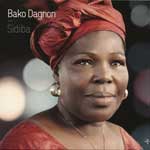Bako learned the griot’s art the old way, sitting at the feet of elders in the towns and villages where Mali’s amazing history—the stuff of griot songs—actually unfolded over the centuries. Her personal history is full of tragedy and misfortune, beginning with the loss of her mother when she was just seven. She famously eschews ornate jewelry and other trappings of griot diva-dom. She’s all about the art, the history, and the sincerity of the performance, and all of that comes through in these 11 tracks, which stick solidly to Mande tradition, mostly ambling, warm grooves, offset by a couple of darker numbers in the Segou and Biriko styles.
“Wouya Larana” typifies the arranging style favored by producers Jean Lamont and Jean-Louis Solans. Soft textures, gentle brush strokes of acoustic guitar, angelic female vocal harmonies, and distant djembe rhythms all set the stage for Bako’s vocal entry, which hits like a brisk wind. The voice is deep, true, brimming with experience and gravitas, not unlike that of the late Wassoulou singer Coumba Sidibe. Track after track, Bako’s august voice makes a striking contrast with lush but subtle, almost gossamer, accompaniments. Though Bako descends from a line of ngoni players, the music here is mostly about guitar and percussion—no kora, balafon or ngoni, except for Harouna Samake’s cameos on kamelengoni (the Wassoulou instrument) on two songs. On most of these tracks, two acoustic guitars interweave, and Mama Cissoko interweaves tasteful electric leads. Solos are short and restrained; there’s no instrumental grandstanding here. It’s all about Bako, and she delivers every time.
“N’Ouhoumba” unfolds over an ambling bass-driven groove, and reveals a lower, warmer register of Bako’s voice. “Alpha Yaya” and “Kono” find her holding forth with pressed urgency, narrating history with a decidedly personal touch. The sense of commitment is overwhelming. “Badijgui” savors the pentatonic Segou style, echoing the blues with a lacing of edgy, horsehair fiddle (soku) from Zoumana Tereta. “Fadeen Tô” sounds darker still, and makes a natural fit with this extraordinary voice. “Bé Bè Bori I No Fé” concludes the set with the warmest most upbeat groove of all. The song delivers release and makes a perfect endnote to an extraordinary release.
-Banning Eyre









